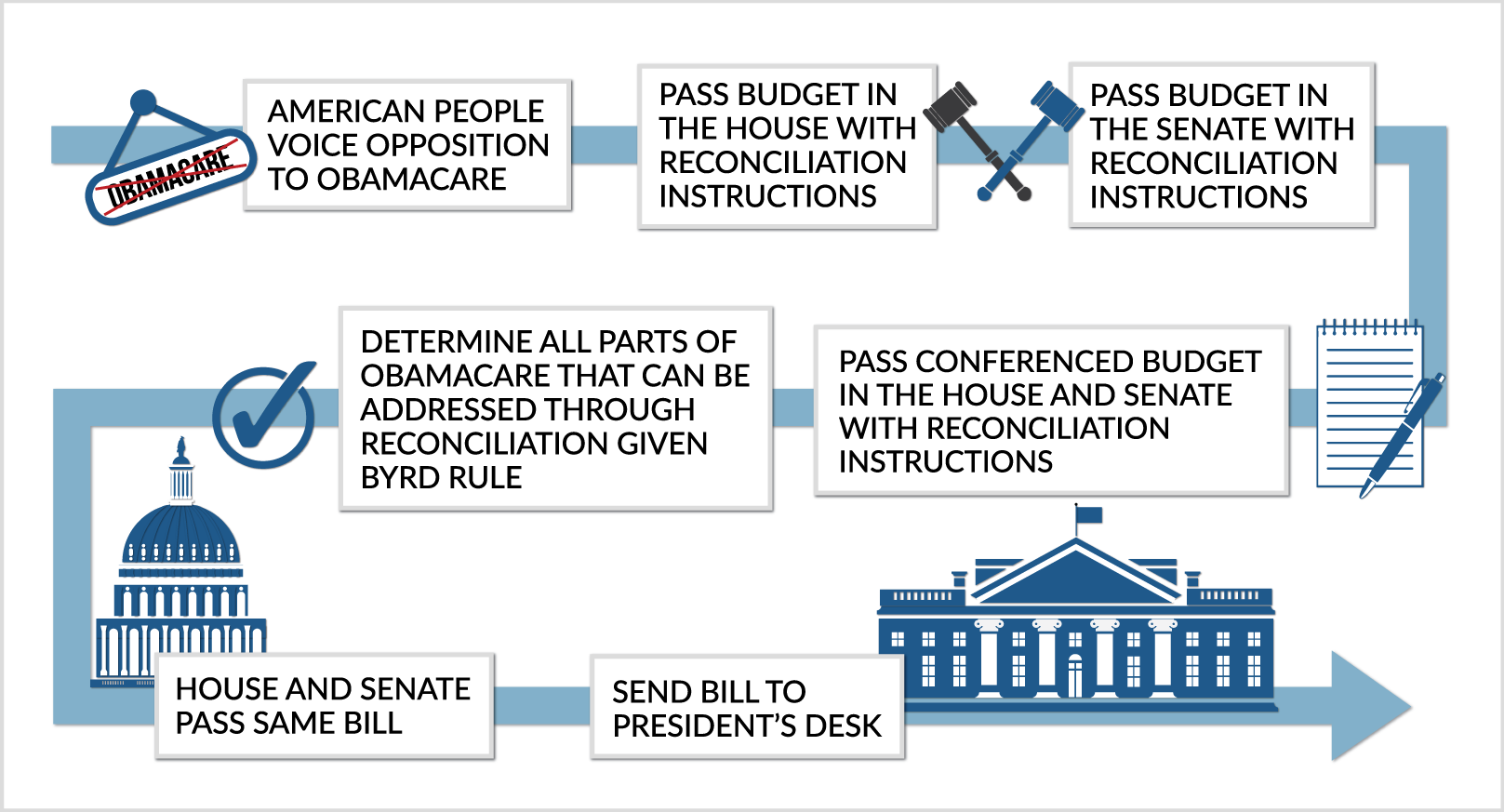Giving Americans Relief From Obamacare
- Obamacare has put health care out of reach for many Americans.
- After more than six years of Obamacare, Americans can finally see light at the end of the tunnel: relief from this unaffordable, unworkable, and unpopular health care law.
- The Republican Congress will work with the new administration to repeal and replace Obamacare with patient-centered reforms.
After suffering through Obamacare for 6 1/2 long years, Americans can finally see light at the end of the tunnel. Though President Obama promised his health care law would lower premiums by $2,500 per year for the typical family, premiums and other health care expenses have skyrocketed. Though Democrats promised people could shop for health insurance as easily as buying a TV on Amazon, people living in most of the country have few options on the exchanges. Doctors and small businesses are struggling to keep up with the law’s tens of thousands of pages of regulations and mandates. People are avoiding medical care because they can no longer afford it.
Repealing Obamacare
Americans will soon have relief from this unaffordable, unworkable, and unpopular law. Republicans promised to repeal and replace Obamacare, and will keep that promise. The Senate and House have already laid the groundwork for repeal through the reconciliation process.
Republicans Pave Way for Obamacare Repeal and Replace

Last year, both chambers passed a joint budget with reconciliation instructions. The House and Senate went through the health care law page by page to determine what could be included in reconciliation and what could not, based on budget rules. Each provision was litigated with the Senate parliamentarian. Many – but not all – of Obamacare’s major provisions were included in the repeal bill. Among other things, the bill:
- Voided the individual and employer mandates by eliminating penalties for failure to comply with them.
- Repealed Obamacare premium tax credits and cost-sharing subsidies after a two-year delay and required collection of overpayments of advance premium tax credits (capped for people with household income below 400 percent of the federal poverty level).
- Repealed the Cadillac tax, medical device tax, prescription drug tax, health insurance tax, chronically ill tax, indoor tanning tax, and Medicare surtax on income above a certain threshold.
- Repealed Obamacare’s prohibitions on the use of health savings accounts, flexible spending accounts, and health reimbursement accounts on over-the-counter medicine and removed Obamacare’s $2,500 per year restriction on untaxed contributions to FSAs.
- Repealed the Prevention and Public Health Fund, which provided the secretary of HHS up to $2 billion per year in mandatory spending with virtually no restrictions.
- Prohibited federal payments to reimburse states for payments from the Medicaid, CHIP, SSBG, and Maternal and Child Health Block Grant programs to entities that meet certain criteria. Increased funding for community health centers by $235 million in fiscal year 2016 and $235 million in fiscal year 2017.
- Prohibited the HHS secretary from collecting fees and making payments under Obamacare’s reinsurance program.
- Repealed Obamacare’s Medicaid expansion expanded match for the newly eligible population after a two-year delay, rescinded remaining Medicaid funding for territories after a two-year delay, and restored Medicaid disproportionate share payments to hospitals that treat a disproportionate share of low-income patients.
- Undid Obamacare’s policy of limiting the deductibility of employer provided prescription drug coverage for retirees when the employer also received a Part D subsidy.
- Directed the secretary of the Treasury to transfer on-budget savings produced by the bill to undo Obamacare’s raid of the Medicare program to fund Obamacare.
Replacing the Failed Law
In addition to repealing Obamacare, Republicans will fix the damage it’s done and repair America’s health care system. Republicans have put forward plans that center on:
- empowering patients to make decisions about their health care by giving them tools, information, and choices;
- providing practical consumer protections to help people who have pre-existing conditions;
- saving and strengthening the Medicare program;
- reforming our broken Medicaid system by giving states more flexibility to provide the best coverage for their citizens;
- and putting patients – not Washington – first.
As we advance new patient-centered policies, Congress will make sure that the transition is a smooth one for Americans. People have already faced too much disruption in their health care due to Obamacare.
Flexibility on Day One
The most immediate relief will come administratively, through the new leadership at the Department of Health and Human Services and other departments. The original health care law itself was 2,700 pages, but there were also more than 40,000 pages of administrative rules, regulatory guidance, and even blog posts setting Obamacare policy. A lot of this can be scaled back on day one. Phrases giving authority to the secretary of HHS – such as “Secretary shall,” “Secretary may,” “Secretary determines,” “Secretary must,” “Secretary will,” and “by the secretary” – appear at least 1,853 times in the law.
“Much of this can be done alone because much of the problem has been created by this [presidential action] alone.” – Majority Leader Mitch McConnell, 11-9-2016
While the damage done by the health care law is not the fault of Republicans, fixing the damage is now Republicans’ responsibility. With strong action on both the executive and legislative fronts, the American people will finally get the health care reform they’ve been seeking for so long.
Next Article Previous Article
